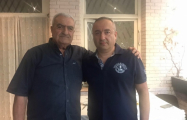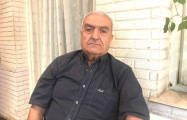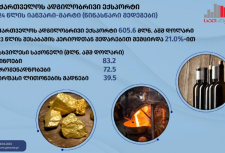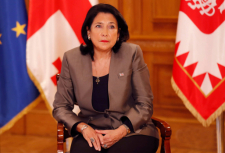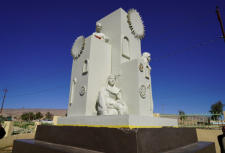Interview with dear Sharoe Kachah
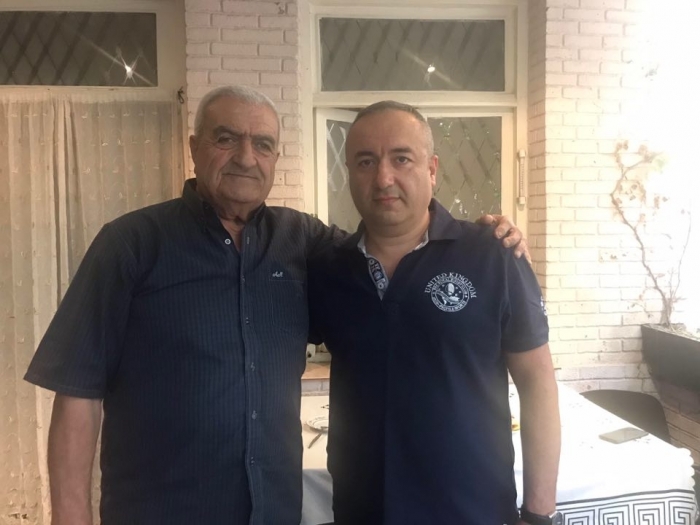
Cultural Center of the Caucasus Yezidis conducted a conversation with a resident of Tbilisi, Sharo Ajamyan Kachakhovich, as part of the study of the Yazidi community in the Caucasus. The center's interest was to reveal the immediate history of the Yazidis in Georgia over the past 50-60 years. It was during this period that the Yazidi community in Georgia reached the highest demographic position and was marked by the fact that the Yazidi community had its own secondary schools and cultural centers, as well as a theater.
Dear Sharoe Kachah tell us about yourself to our readers.
"My name is Sharo Kachah. Born in 1942 in the village of Tlik (Armenia). I started going to school in the village of Tlik until the 5th grade. When I moved to the 6th grade my father and my family decided to move to Georgia it was 1956. I continued my education at 21 secondary schools in Tbilisi in Didube.
How did the Yazidi Diaspora live in Georgia before? Were there Yazidi language schools or faculties?
- Our community used to have a school in the Yazidi language. Rest in peace uncle Bahcho, he then opened the faculty of Yezidi girls and boys in 21 secondary schools in Didube. Years later, the school closed, and he moved to teach at Lotkin's 7th school. He also had an assistant, Aziz Isco. There was also a Yazidi theater. To be honest, the Yazidis lived well. Then, after the collapse of the USSR, everything changed. Many Yazidis migrated to other countries for one reason or another. It was said that about 36 thousand people lived in Tbilisi, but I think about 350 thousand people lived all over Georgia. Now we are at best about 10 thousand. Fortunately, there is still a connection between the community, but this is thanks to us older people, but after us, no one knows what will happen to the youth.
How do you think the Yazidi Diaspora lives now?
- To be honest, we all have a bad life here, that the Yazidis, the Georgians. If it weren't for our relatives who live in Europe or Russia, we would live here without money. They help their relatives financially. There is little work in Georgia. Yazidi schools and theaters are also not left in this regard, the culture of the Yazidi people is disappearing. My children and grandchildren graduated from Georgian and Russian schools.
Yazidi youth in Georgia find a means of subsistence?
- Previously, many people worked as janitors, now in stores, taxi drivers. What else can I say, they find a job where at least something is paid to them. There are not many young people left here, everyone has already left.
Do you think many Yazidis have emigrated to other countries in recent years?
- Believe it or not, about 90% of Yazidis have left. Who's left here? Previously, here, where I lived on Lotkin, there were about 200 families, but now there are only 20-30 families left.
Why do you think most people stopped going to Ziarat?
- You know, everything has changed. Previously, during the Soviet Union, our feasts and shekhs came to us themselves. We were happy when it happened. Now everyone is jealous of each other and feuding among themselves. Therefore, young people see all this in them and lose interest in all this. The problem is that the shekhi and pirs themselves cannot agree with each other , they argue, swear, and this background repels the youth and the adult generation. For example, when our grandfather died, the chief of our house came from Armenia. He was an old man, and one night he sat in front of my grandfather's body and didn't go to sleep. We asked him to go to bed, but he said that how can I go to sleep when such a person has died. What can I say about the current shekhs?
During the pandemic, did anyone come and inform the Yazidi community in our native language?
- To be honest, I don't understand what you are talking about, there was no such information. We learned everything from the Georgian authorities. About the English language there is no one briefed us on it. Fortunately, there is one Yazid Ankosi who helps others and gives them a job at home.
Do you know any Yazidis among the teachers, police officers, and so on?
-No, I don't know them, but I'm sure there are. Many Yazidi guys work in the police. There is a Yazidi lawyer Nadoyan. Yes, Yazidis work in many areas, as I know.
Why do you think Yazidis in Georgia change their religion?
-"I just answered you." There is no connection between the clergy and the youth, so the Yazidis began to switch to another religion. There is no connection between us.
As for our language, why do we speak it less and less often, especially young people ?
- If anyone is to blame, it is the head of the family who does not speak their own language. Fish goes out from the head. If I don't speak Yazidi in my home , my grandchildren won't know it either. If someone from my family speaks to me in a language other than Yazidi, I scold them. We must talk ourselves to be an example, no one else can help us.
Does the Yazidi community have a future in Georgia?
- It all depends on the country where we live. If everything goes well in it, so will we. We also live like the citizens of this country. As for the young people who have left for other countries, I always pray that life here will become better and our young people will return to their homes where they were born. To be honest, it is hard to believe that those who have already started living in those countries and earning well are unlikely to return. The main thing for us is to keep the current youth. I am very happy that you are helping and highlighting the acute issues that concern the Yazidi community.
Tags: #yazidisinfo #newsyezidi #aboutyazidi #ezidi #yezidiofcaucasus #yezidiofgeorgia
Interview with dear Sharoe Kachah

Cultural Center of the Caucasus Yezidis conducted a conversation with a resident of Tbilisi, Sharo Ajamyan Kachakhovich, as part of the study of the Yazidi community in the Caucasus. The center's interest was to reveal the immediate history of the Yazidis in Georgia over the past 50-60 years. It was during this period that the Yazidi community in Georgia reached the highest demographic position and was marked by the fact that the Yazidi community had its own secondary schools and cultural centers, as well as a theater.
Dear Sharoe Kachah tell us about yourself to our readers.
"My name is Sharo Kachah. Born in 1942 in the village of Tlik (Armenia). I started going to school in the village of Tlik until the 5th grade. When I moved to the 6th grade my father and my family decided to move to Georgia it was 1956. I continued my education at 21 secondary schools in Tbilisi in Didube.
How did the Yazidi Diaspora live in Georgia before? Were there Yazidi language schools or faculties?
- Our community used to have a school in the Yazidi language. Rest in peace uncle Bahcho, he then opened the faculty of Yezidi girls and boys in 21 secondary schools in Didube. Years later, the school closed, and he moved to teach at Lotkin's 7th school. He also had an assistant, Aziz Isco. There was also a Yazidi theater. To be honest, the Yazidis lived well. Then, after the collapse of the USSR, everything changed. Many Yazidis migrated to other countries for one reason or another. It was said that about 36 thousand people lived in Tbilisi, but I think about 350 thousand people lived all over Georgia. Now we are at best about 10 thousand. Fortunately, there is still a connection between the community, but this is thanks to us older people, but after us, no one knows what will happen to the youth.
How do you think the Yazidi Diaspora lives now?
- To be honest, we all have a bad life here, that the Yazidis, the Georgians. If it weren't for our relatives who live in Europe or Russia, we would live here without money. They help their relatives financially. There is little work in Georgia. Yazidi schools and theaters are also not left in this regard, the culture of the Yazidi people is disappearing. My children and grandchildren graduated from Georgian and Russian schools.
Yazidi youth in Georgia find a means of subsistence?
- Previously, many people worked as janitors, now in stores, taxi drivers. What else can I say, they find a job where at least something is paid to them. There are not many young people left here, everyone has already left.
Do you think many Yazidis have emigrated to other countries in recent years?
- Believe it or not, about 90% of Yazidis have left. Who's left here? Previously, here, where I lived on Lotkin, there were about 200 families, but now there are only 20-30 families left.
Why do you think most people stopped going to Ziarat?
- You know, everything has changed. Previously, during the Soviet Union, our feasts and shekhs came to us themselves. We were happy when it happened. Now everyone is jealous of each other and feuding among themselves. Therefore, young people see all this in them and lose interest in all this. The problem is that the shekhi and pirs themselves cannot agree with each other , they argue, swear, and this background repels the youth and the adult generation. For example, when our grandfather died, the chief of our house came from Armenia. He was an old man, and one night he sat in front of my grandfather's body and didn't go to sleep. We asked him to go to bed, but he said that how can I go to sleep when such a person has died. What can I say about the current shekhs?
During the pandemic, did anyone come and inform the Yazidi community in our native language?
- To be honest, I don't understand what you are talking about, there was no such information. We learned everything from the Georgian authorities. About the English language there is no one briefed us on it. Fortunately, there is one Yazid Ankosi who helps others and gives them a job at home.
Do you know any Yazidis among the teachers, police officers, and so on?
-No, I don't know them, but I'm sure there are. Many Yazidi guys work in the police. There is a Yazidi lawyer Nadoyan. Yes, Yazidis work in many areas, as I know.
Why do you think Yazidis in Georgia change their religion?
-"I just answered you." There is no connection between the clergy and the youth, so the Yazidis began to switch to another religion. There is no connection between us.
As for our language, why do we speak it less and less often, especially young people ?
- If anyone is to blame, it is the head of the family who does not speak their own language. Fish goes out from the head. If I don't speak Yazidi in my home , my grandchildren won't know it either. If someone from my family speaks to me in a language other than Yazidi, I scold them. We must talk ourselves to be an example, no one else can help us.
Does the Yazidi community have a future in Georgia?
- It all depends on the country where we live. If everything goes well in it, so will we. We also live like the citizens of this country. As for the young people who have left for other countries, I always pray that life here will become better and our young people will return to their homes where they were born. To be honest, it is hard to believe that those who have already started living in those countries and earning well are unlikely to return. The main thing for us is to keep the current youth. I am very happy that you are helping and highlighting the acute issues that concern the Yazidi community.
Tags: #yazidisinfo #newsyezidi #aboutyazidi #ezidi #yezidiofcaucasus #yezidiofgeorgia
